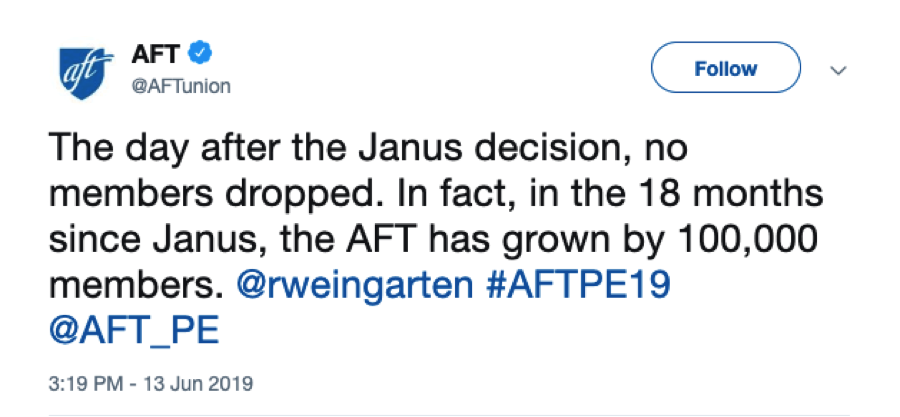National Teachers’ Union Claim of No Members Lost Day After Janus is Misleading
As the one-year anniversary of Janus v. AFSCME approaches, the national teachers’ union AFT (American Federation of Teachers) recently made a misleading claim about the case’s impact on union membership.

“The day after the Janus decision, no members dropped,” tweeted AFT.
AFT’s claim leads the public to assume all union members had the choice to resign from membership the day after the Supreme Court’s ruling, which they did not.
Following the June 27, 2018 decision, only public-sector employees who were previously known as “fair-share” payers were immediately freed from any financial commitment to government unions. They no longer had to pay “fair-share” fees, and their employers had to stop deducting those fees from their paychecks. Fair-share payers were not considered members.
Union members, however, were not automatically released from their monetary obligation to their union nor were they able to immediately drop their union membership if they so desired. Constrained by pre-Janus union terms, public employees who signed a union card authorizing the deduction of dues are still restricted to narrow resignation windows once a year.
For teachers in Minnesota—who pay dues to AFT because it is a national affiliate of their state union Education Minnesota—their revocation period is in September. Numerous teachers have shared with us their unsuccessful attempts to resign union membership either before or after the September window, confirming that any desire to resign the day after the Janus decision would also have likely been denied.
Other state unions affiliated with AFT, such as Washington and Pennsylvania, bind members to a resignation window that is based on when they signed their union card or when the collective bargaining agreement was signed. Typical card language for these revocation periods reads,
“This authorization shall be irrevocable for a period of one year from the date of signature or until the expiration date of the collective bargaining agreement between the employer and the union, whichever occurs sooner, and for the year to year thereafter unless I give the employer and the union written notice of revocation not less than 10 days and not more than 25 days before the end of the annual period beginning with the date of my signature on this form.”
Union resignations based on the anniversary date of the membership card are challenging to execute because many public employees do not know or remember the exact date they signed the authorization. To determine the date, they must have a copy of their card. If they do not have a copy of their card, they must ask the union for a copy, which we have heard is not always easy to obtain.
To play devil’s advocate, if a public employee’s unique resignation window (which is usually around 15 days in length) included June 28, the day after the Janus decision, and that public employee knew this date was part of his or her window and chose to remain a member, then yes, Janus had no impact on that particular member’s status. But it is inaccurate to allude to all members having this same resignation window.
AFT could give members the opportunity to resign when they so choose, but that would mean relinquishing control over how and when union members get to decide whether membership is right for them.
Union resignation windows create an unnecessary burden on public employees trying to exercise their First Amendment rights, and we believe they will be found unconstitutional.
AFT’s tweet continued with a membership growth update, claiming AFT “has grown by 100,000 members” in the “18 months since Janus.” According to federal filings, AFT’s most recent report that includes membership totals covers July 1, 2017 to June 30, 2018. While these dates include a couple of days following the Janus decision, they are not going to reflect complete fluctuations in membership totals given the resignation constraints I described above. More of the story will be revealed in the upcoming filing that covers July 1, 2018 to June 30, 2019. This data is not yet public. (If AFT is using the most recent public membership total, an increase of 100,000 members is about six percent in growth.)
It will take time to know the full effects of Janus. Not all public employees are being told about their Janus Rights, but we will tell them. Join us at EducatedTeachersMN.com and EmployeeFreedomMN.com for resources devoted to meeting the needs of teachers and local and state employees.